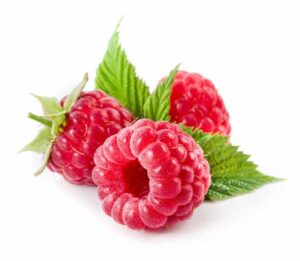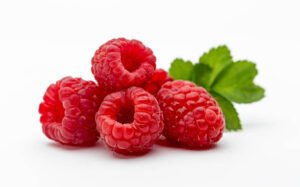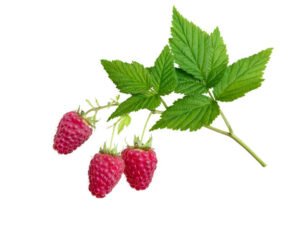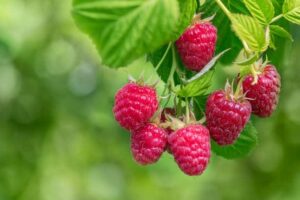These delightful, ruby-red jewels of the berry world are more than just a tasty treat. Bursting with flavor and packed with essential nutrients, raspberries have long been celebrated for their numerous health benefits. In this article, we’ll explore the scientific evidence behind the advantages of consuming raspberries, shedding light on their remarkable raspberry benefits.
Rich in Antioxidants
One of the most compelling reasons to include raspberries in your diet is their high antioxidant content. Antioxidants are compounds that help protect the body from oxidative stress and damage caused by free radicals. Raspberries are particularly rich in polyphenols, such as anthocyanins and quercetin, which have potent antioxidant properties.
Additionally, raspberries stand out for their remarkable ORAC (Oxygen Radical Absorbance Capacity) value, which measures the antioxidant capacity of foods. The vibrant red hue of raspberries is attributed to their high anthocyanin content, known for not only providing antioxidant benefits but also contributing to anti-inflammatory effects.
Moreover, the unique combination of vitamins, such as vitamin C and manganese, in raspberries complements their antioxidant prowess. Vitamin C, a potent antioxidant itself, works synergistically with the polyphenols, enhancing the overall protective effects against oxidative stress.
- Reference: Prior, R. L., Cao, G., Martin, A., Sofic, E., McEwen, J., O’Brien, C., … & Mainland, C. M. (1998). Antioxidant capacity as influenced by total phenolic and anthocyanin content, maturity, and variety of Vaccinium species. Journal of Agricultural and Food Chemistry, 46(7), 2686-2693.
Heart Health
 Consuming raspberries can contribute to a healthier heart. Research published in the American Journal of Clinical Nutrition suggests that regular consumption of anthocyanin-rich foods, like raspberries, is associated with a reduced risk of heart attacks.
Consuming raspberries can contribute to a healthier heart. Research published in the American Journal of Clinical Nutrition suggests that regular consumption of anthocyanin-rich foods, like raspberries, is associated with a reduced risk of heart attacks.
Furthermore, the high levels of dietary fiber in raspberries play a crucial role in regulating cholesterol levels, promoting optimal heart function. The presence of ellagic acid, a natural compound found in raspberries, may also contribute to reducing oxidative stress, thereby fortifying the heart against potential damage.
Packed with fiber, antioxidants, and vitamins, raspberries support cardiovascular well-being by promoting lower blood pressure and improved cholesterol levels.
- Reference: Cassidy, A., O’Reilly, É. J., Kay, C., Sampson, L., Franz, M., Forman, J. P., & Rimm, E. B. (2011). Habitual intake of flavonoid subclasses and incident hypertension in adults. The American Journal of Clinical Nutrition, 93(2), 338-347.
Weight Management
 If you’re aiming for weight management, raspberries can be a valuable addition to your diet. A study in the journal Nutrients found that raspberry ketones may help increase the breakdown of fat by enhancing the body’s metabolism.
If you’re aiming for weight management, raspberries can be a valuable addition to your diet. A study in the journal Nutrients found that raspberry ketones may help increase the breakdown of fat by enhancing the body’s metabolism.
Furthermore, raspberries are not only low in calories but also high in dietary fiber, promoting a feeling of fullness and reducing overall calorie intake. The presence of anthocyanins, the natural pigments responsible for the berry’s vibrant color, has been linked to improved weight management by potentially influencing metabolic processes.
- Reference: Park, K. S. (2010). Raspberry ketone increases both lipolysis and fatty acid oxidation in 3T3-L1 adipocytes. Planta Medica, 76(15), 1654-1658.
Cognitive Function
The compounds in raspberries may have a positive impact on cognitive function. Researchers at the Human Nutrition Research Center on Aging at Tufts University discovered that diets rich in berries, including raspberries, are associated with slower cognitive decline in older adults.
Raspberries, being a rich source of antioxidants like quercetin and gallic acid, showcase distinctive qualities in supporting cognitive function. These compounds have been linked to potential neuroprotective effects, aiding in the defense against oxidative stress and inflammation in the brain.
Additionally, the high fiber content in raspberries may contribute to improved cognitive health by promoting stable blood sugar levels and fostering a healthier gut microbiota. Incorporating these vibrant berries into your diet could be a flavorful and beneficial way to nurture cognitive well-being.
- Reference: Devore, E. E., Kang, J. H., Breteler, M. M., & Grodstein, F. (2012). Dietary intakes of berries and flavonoids in relation to cognitive decline. Annals of Neurology, 72(1), 135-143.
Digestive Health
 Raspberries are an excellent source of dietary fiber. A study in the journal Food Chemistry found that raspberry consumption led to beneficial changes in the gut microbiota, promoting gut health.
Raspberries are an excellent source of dietary fiber. A study in the journal Food Chemistry found that raspberry consumption led to beneficial changes in the gut microbiota, promoting gut health.
Furthermore, the high content of soluble and insoluble fiber in raspberries contributes to maintaining regular bowel movements, preventing constipation, and supporting overall digestive well-being. The antioxidants present in raspberries, such as quercetin and ellagic acid, add an extra layer of protection against oxidative stress, fostering a balanced and resilient digestive system.
- Reference: Hidalgo, M., Oruna-Concha, M. J., & Kolida, S. (2012). A study into the in vitro microbial metabolism of raspberry anthocyanins. Food Chemistry, 132(1), 175-181.
Anticancer Potential
Emerging research has suggested that raspberries may have anticancer properties due to their ellagic acid content. A study in the journal Molecules reported that ellagic acid from raspberries exhibited potent anticancer effects against various types of cancer.
Moreover, raspberries are rich in antioxidants, including quercetin and anthocyanins, which further contribute to their potential anticancer prowess. These compounds have been shown to inhibit the growth of cancer cells and reduce inflammation, adding an extra layer of defense against carcinogenesis. The unique combination of ellagic acid and diverse antioxidants makes raspberries a flavorful and promising addition to a cancer-fighting diet.
- Reference: Seeram, N. P., Adams, L. S., Zhang, Y., Lee, R., Sand, D., Scheuller, H. S., & Heber, D. (2006). Blackberry, black raspberry, blueberry, cranberry, red raspberry, and strawberry extracts inhibit growth and stimulate apoptosis of human cancer cells in vitro. Journal of Agricultural and Food Chemistry, 54(25), 9329-9339.
Skin Health
 Raspberries are a source of vitamin C, which supports skin health. Vitamin C helps the body produce collagen, a protein that maintains skin elasticity and prevents signs of aging, such as wrinkles.
Raspberries are a source of vitamin C, which supports skin health. Vitamin C helps the body produce collagen, a protein that maintains skin elasticity and prevents signs of aging, such as wrinkles.
Raspberries, in addition to their vitamin C content, bring a unique array of antioxidants to the table. These antioxidants, including quercetin and ellagic acid, play a crucial role in protecting the skin from oxidative stress and reducing inflammation. Furthermore, the high fiber content in raspberries promotes a healthy gut, contributing indirectly to skin health by supporting the body’s overall well-being.
Moreover, raspberries contain anthocyanins, pigments responsible for their vibrant color, which have been linked to improved skin tone and radiance. The combination of vitamins, antioxidants, and phytonutrients in raspberries makes them a delicious and nutritious addition to your diet, offering multifaceted benefits for maintaining a youthful and glowing complexion.
- Reference: Pullar, J. M., Carr, A. C., & Vissers, M. C. (2017). The roles of vitamin C in skin health. Nutrients, 9(8), 866.
Gut Health
Raspberries are renowned for their high dietary fiber content. Just one cup of raspberries provides approximately 8 grams of dietary fiber, making them a significant source. Fiber plays a crucial role in maintaining digestive health. It aids in regular bowel movements, prevents constipation, and supports a diverse gut microbiome. A study published in the journal Food Chemistry found that raspberry consumption led to beneficial changes in the gut microbiota, promoting gut health.
Raspberries, with their vibrant color and unique taste, stand out not only for their fiber content but also for their rich array of antioxidants. These antioxidants, such as quercetin and ellagic acid, contribute to the overall well-being of the digestive system. Beyond promoting regular bowel movements, raspberries’ antioxidant properties help combat oxidative stress, potentially reducing inflammation and supporting a healthy gut environment.
Furthermore, the high water content in raspberries adds an extra layer of hydration, aiding in digestion and promoting a balanced gut environment. With their delightful flavor and multifaceted approach to gut health, incorporating raspberries into your diet becomes not only a tasty treat but also a nourishing choice for your digestive well-being.
- Reference: Hidalgo, M., Oruna-Concha, M. J., & Kolida, S. (2012). A study into the in vitro microbial metabolism of raspberry anthocyanins. Food Chemistry, 132(1), 175-181.
Nutritional value per 100 grams of raspberry
- Calories: Approximately 52 kilocalories (kcal)
- Water: Approximately 87 grams
- Protein: Approximately 1.5 grams
- Fat: Approximately 0.7 grams
- Saturated Fat: Approximately 0.015 grams
- Unsaturated Fat: Approximately 0.2 grams
- Carbohydrates: Approximately 11.9 grams
- Sugars: Approximately 4.4 grams
- Fiber: Approximately 6.5 grams
- Vitamin C: Approximately 26.2 milligrams (mg) (about 44% of the recommended daily intake)
- Vitamin K: Approximately 7.8 micrograms (µg) (about 10% of the recommended daily intake)
- Vitamin E: Approximately 0.9 mg
- Folate: Approximately 21 µg
- Potassium: Approximately 151 mg
- Magnesium: Approximately 22 mg
- Calcium: Approximately 25 mg
- Iron: Approximately 0.7 mg
- Zinc: Approximately 0.42 mg
This nutritional value provides a general overview of the raspberry’s nutritional content. It’s important to note that values can slightly vary depending on the raspberry variety and ripeness. Raspberries are rich in fiber, vitamin C, and antioxidants, making them a healthy and delicious choice for a variety of diets.
Conclusion
Scientific evidence demonstrates that raspberries offer a wide range of health benefits, including antioxidant protection, heart health support, weight management, cognitive function enhancement, digestive health promotion, potential anticancer properties, and benefits for skin health. Incorporating raspberries into your diet can be a delicious and nutritious way to promote overall health and well-being.
 Are you in search of a dessert that strikes the perfect balance between decadence and freshness? Look no further. Jamie Oliver’s Raspberry Burnt Cream recipe is a culinary masterpiece that combines the rich, velvety goodness of a classic crème brûlée with the vibrant, tangy burst of raspberries. It’s a dessert that not only tantalizes the taste buds but also showcases the elegance of French cuisine with a delightful twist.
Are you in search of a dessert that strikes the perfect balance between decadence and freshness? Look no further. Jamie Oliver’s Raspberry Burnt Cream recipe is a culinary masterpiece that combines the rich, velvety goodness of a classic crème brûlée with the vibrant, tangy burst of raspberries. It’s a dessert that not only tantalizes the taste buds but also showcases the elegance of French cuisine with a delightful twist.
Contraindications
In general, raspberries are considered safe and nutritious for most people when consumed as part of a balanced diet. However, there are a few considerations and potential contraindications to keep in mind:
Allergies:
Some individuals may be allergic to raspberries or other berries. Allergic reactions can range from mild itching and hives to severe symptoms like difficulty breathing. If you have known berry allergies, it’s essential to avoid raspberries.
Medication Interactions:
Raspberries contain salicylates, which are natural compounds found in some fruits and plants. Salicylates can interact with blood-thinning medications (e.g., warfarin) and may increase the risk of bleeding. If you are taking such medications, consult your healthcare provider before significantly increasing your raspberry consumption.
Gastrointestinal Sensitivity:
Raspberries are a good source of dietary fiber, which can sometimes cause digestive discomfort in individuals with sensitive stomachs or those not accustomed to high-fiber foods. If you experience digestive issues, consider moderating your raspberry intake or gradually increasing your fiber consumption to allow your gut to adjust.
Kidney Stones:
Raspberries contain oxalates, which are compounds that can contribute to the formation of kidney stones in susceptible individuals. If you have a history of kidney stones, it may be advisable to limit your raspberry consumption and consult a healthcare professional for dietary recommendations.
Pesticide Residues:
Like other fruits and vegetables, raspberries may contain pesticide residues. It’s a good practice to wash raspberries thoroughly or opt for organic raspberries to minimize potential pesticide exposure.
Interaction with Certain Medical Conditions:
Individuals with specific medical conditions, such as irritable bowel syndrome (IBS) or fructose malabsorption, may need to limit their raspberry consumption due to the fruit’s natural sugars and fiber content, which can trigger digestive discomfort in some cases.
It’s crucial to consult with a healthcare professional or a registered dietitian if you have concerns about how raspberry consumption may affect your health, especially if you have underlying medical conditions or are taking medications. They can provide personalized guidance based on your individual health needs and dietary preferences.
Fascinating Facts About Raspberry
- Berry Doppelgangers: The Hidden Identity of Raspberries
Did you know that raspberries have botanical look-alikes? Blackberries and raspberries often get confused, but the true distinction lies in their core – raspberries leave the core behind when picked, creating a unique, hollowed appearance. This subtle nuance sets raspberries apart from their berry brethren.
- Ancient Symbolism: Raspberries in Myth and Lore
Raspberries have been revered in folklore for centuries. In Greek mythology, raspberries were associated with fertility and were believed to have magical properties. Ancient Romans even used raspberries as a symbol of hospitality. Unraveling the threads of mythology, raspberries emerge not just as fruits but as symbols woven into the tapestry of ancient beliefs.
- Berry Fragrance: Raspberry Perfume Mysteries
Beyond their taste, raspberries boast a captivating aroma that extends beyond the kitchen. The essence of raspberries is utilized in the perfume industry, adding a fruity and enticing note to various fragrances. Who knew that the humble raspberry could be a secret ingredient in the world of perfumery?
- Berry Bling: Raspberries as Natural Dye
Raspberries hold a surprising secret for DIY enthusiasts. The vibrant hue of raspberries can be extracted and used as a natural dye for fabrics and crafts. Imagine the artistic possibilities, as the berry transforms into a tool for creating eco-friendly and uniquely colored masterpieces.
- Berry Time Capsules: Raspberries in Ice Age Resurrections
In an unexpected twist, researchers have uncovered ancient seeds of raspberries preserved in the Siberian permafrost. These prehistoric seeds have defied time, with some estimated to be around 32,000 years old. Scientists are now exploring the potential of reviving these ancient raspberries, creating a link between the past and the present.
- Culinary Alchemy: Raspberries in Savory Surprises
Raspberries aren’t confined to the realm of sweets. Unconventional chefs have experimented with raspberries in savory dishes, creating unique pairings that defy culinary expectations. From raspberry-infused vinaigrettes to savory sauces, these berries showcase their versatility in the kitchen in unexpected and delightful ways.
- Berry Star Power: Raspberries in Celestial Naming
The etymology of raspberries takes a celestial turn. The name “raspberry” is derived from the Old English word “raesberie,” meaning “rough berry.” This roughness, however, doesn’t diminish their star power – raspberries are celestial jewels in the culinary universe.
- Cosmic Siblings: Raspberries and the Galactic Connection
Believe it or not, raspberries share a cosmic connection. Scientists have discovered a molecule called raspberry ketone, which gives raspberries their distinct aroma. Intriguingly, this molecule has also been identified in distant galaxies, suggesting that the essence of raspberries resonates far beyond our earthly boundaries.
- Berry Whispers: The Echoes of Raspberry Communication
In a revelation that borders on the fantastical, researchers have observed that raspberry plants engage in communication through airborne signals. When attacked by pests, the plants release volatile compounds that signal neighboring plants to activate their defense mechanisms. Raspberries, it seems, have a secret language that extends beyond the audible.
- Berry Underworld: The Subterranean Life of Raspberry Roots
Beneath the soil, raspberry roots engage in a peculiar dance. They exhibit a phenomenon called allelopathy, releasing compounds that inhibit the growth of nearby plants. This subterranean strategy helps raspberries carve out their own territory, showcasing an underground world of botanical intrigue.
- Time-Traveling Seeds: Raspberries in the Seedscape of Millennia
Venturing into the realm of botanical time travel, some raspberry seeds have been found preserved in ancient deposits. These seeds, entombed in layers of sediment, offer a glimpse into the berry’s evolutionary past and hold the potential for unraveling the mysteries of bygone ecosystems.
- Berry Fortune-Telling: Raspberry Resonance in Folklore
Delving into the mystical, raspberries have been tied to fortune-telling in European folklore. According to tradition, if you split a raspberry in half and give one half to your romantic interest, you’ll create a bond of love. This age-old belief adds a touch of whimsy to raspberries as not just a fruit but as love tokens in the hands of romantics.
- Berry Architects: Raspberries’ Intricate Growth Puzzles
Raspberry plants exhibit a curious architectural prowess. The intricate geometry of their growth forms a natural puzzle that mathematicians find fascinating. The Fibonacci sequence, golden ratio, and fractal patterns manifest in the branching structure of raspberry canes, turning the berry patch into a living mathematical masterpiece.
- Cosmic Culinary Choreography: Raspberries’ Dance with Microgravity
In an interstellar twist, raspberries have ventured beyond Earth’s atmosphere. During an experiment aboard the International Space Station, researchers cultivated raspberries in microgravity conditions. The cosmic berries not only adapted to their extraterrestrial surroundings but also managed to produce fruits, showcasing the resilience and adaptability of these earthly delights.
- Ancient Origins: Raspberries in the Time of the Romans
Raspberries have a storied history, dating back to the Roman Empire. Initially, these berries grew wild in Eastern Europe, and Romans were among the first to cultivate and appreciate their unique taste. The popularity of raspberries has endured through the ages, becoming a staple in various cuisines.
- Berry Etymology: The Origins of the Raspberry Name
The word “raspberry” finds its roots in Old English, where “rasp” means sweet, referring to the berries’ naturally sweet flavor. Interestingly, raspberries are not true berries but aggregate fruits, composed of numerous smaller individual drupelets that collectively create the distinctive berry shape.
- Perennial Pruning: Raspberries’ Unique Growing Habit
Raspberry plants have a fascinating growth pattern known as perennial pruning. The canes that bear fruit typically grow for two years, producing berries in the second year before withering away. New canes then emerge to continue the cycle, showcasing the plant’s self-renewing and sustainable nature.
- Berry Resilience: Raspberries’ Cold-Weather Endurance
Raspberries are resilient against cold temperatures, thriving in cooler climates. Some varieties can endure frosty conditions, even to the point of being cultivated in regions with harsh winters. This cold tolerance makes raspberries a hardy and versatile fruit with global appeal.
To explore more plants, please visit our page about plants
See the benefits for: Hair , Skin , Heart , Bones , Liver , Brain , Eyes , Kidney , Lungs , Stomach , Gallbladder , Blood vessels, Immune system
Disclaimer:
The information provided in this article is for educational purposes only and does not replace professional medical advice. Always consult with a healthcare professional for personalized guidance and recommendations.
